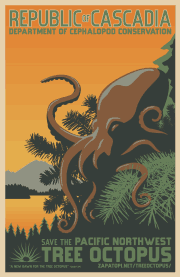Let's talk about tentacles...

When we, as teachers, begin the process of looking at information literacy as a study unto itself and incorporating it into our curriculum, there are several places we look for items to illustrate the need for these skills. One of these places is a site of the Pacific Northwest Tree Octupus. Now, looking at the title, an average individual would think of this site as bogus, which it is. Although, I would challenge you and your students to take a look at this site. The site has a high quality look and feel to it and the average 13-14 year old might look at it and validate it on looks alone. Students, like many of us, judge the book by its cover! This really illustrates the need for information literacy(IL) and digital citizenship (DC) instruction in our schools. The road block? We need more teachers and administrators to include IL and DC as as part of the greater definition of literacy we want our students to achieve. How far do the fabled tentacles of the Pacific Northwest Tree Octopus extend into our schools?
Students, the Digital Natives of our culture; are wired, unwired and ultra-mobile. It is not uncommon to find a high school student with the TV on, listening to music from iTunes on their computer, with three or four browser windows open and at the same time engaging in a few instant messages sessions and a cell phone call with one of their friends. The students we teach don't just use technology, they devour it. Last November, I was at the Monterey CLMS conference and went to the keynote presentation given by David Warlick, where he likened students use of technology to the tentacles of an octopus, far reaching and able to bring in many different resources at the same time. His talk quickly turned to the point that when students enter schools, we cut off the tentacles they use to pull in all of the information they use in their personal lives. What would happen to an octopus if we cut off all of its tentacles? It would more than likely die because it would be unable to feed and defend itself. Are we creating a situation where students can't feed and defend themselves?

What do they need to eat? Information, but not just any information, they need the information that is going to prepare them for the challenges of their adult lives. In the wild, animals quickly learn who their allies and enemies are and how to best provide for their survival. Students need to learn these same skills in the world that they encounter in their everyday lives.
How do students know what is valid and what is bogus? Do we teach them that? How much of what students consume as patrons of the Internet is valid? Are there opinions, or more accurately, different interpretations on the same set of facts that are available on the Internet? These are all reasons why information literacy and digital citizenship are so important and must be part of what we consider the new definition of what it means to be literate!
What do we need to do?
- Develop ways for students to build their own filtering system for Internet resources
** I am currently working on a criteria to validate Internet resources. What do you think should be involved. Drop me a note! I would like to have a single page guide that would assist students in validating Internet resources.
- Talk to teachers and administrators and get them to include information literacy and digital citizenship skills into the curriculum. I know everyone has more content than they can possibly teach, but these skills are the tools that will 'unlock' all of the information that will allow students to teach themselves.
- Read more: Parents, teachers, administrators and students. The more people read, regardless of the content, the more they develop their skills for identifying nuances in the text, discovering the 'under the surface' material in a passage and in turn become better consumers of the media.